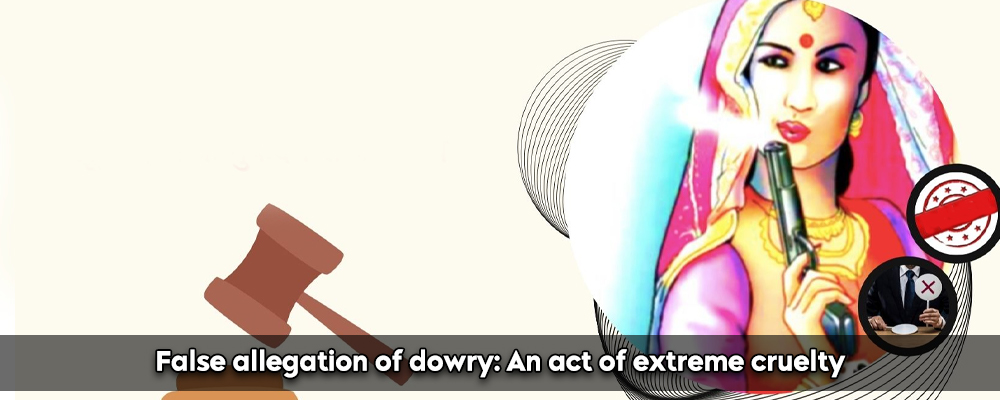The husband or any relative of the husband who subjected a lady to cruelty is punished under Section 498A of the Indian Penal Code 1860 (IPC). Cruelty in this context includes Conduct that is likely to force a woman to commit suicide, give her serious damage, or jeopardize her life; Harassment of a lady or any of her family to fulfill an illegal demand for money, property, or other valued security.
The Supreme Court has often stated that males are equally vulnerable to cruelty in marital conditions as women and can seek divorce on that grounds. The Court has stated that the standard for determining whether a person’s action constitutes cruelty is not whether it appears cruel to a reasonable person or a person with normal sensibilities, but rather what effect it would have on the aggrieved spouse who is before the court. This is because what is cruel to one person may not be hurtful to another. So, the individual alleging cruelty merely needs to show that their spouse’s actions led them to have a reasonable fear that continuing to live with their spouse would be hurtful or injurious.
Need A Legal Advice
The internet is not a lawyer and neither are you. Talk to a real lawyer about your legal issue

How husbands are affected
Recently, criminal law has undergone some extreme revisions to safeguard women, which has resulted in adding additional teeth to existing statutes (D.P. Act, 498-A, 406 IPC, and so forth). Because these laws are non-compoundable and non-bailable, the possibility of compromise between the spouses following suit is almost zero. It means that when a complaint is filed, everyone identified in the complaint is held accountable in the eyes of the law.
Section 498-A of the IPC is a criminal legislation that allows the wife and her parents to prosecute any or all of the husband’s relatives with bodily or mental mistreatment. In these circumstances, the accused relatives are usually women of various ages (unmarried, wedded sisters of the spouse, his mother and sisters-in-law, elderly grandparents, and aunts). Other maternal and paternal family members, as well as tiny children, are included in the family.
Defensive measures
Men can defend themselves and their families from being imprisoned as a result of the false allegation.
- They have the following options for protecting their family and themselves:
- Record any discussions (phone, chat, email, letters, and so on) with individuals who are threatening, preserve the originals in a safe location, and do not present the actual proof in front of anyone.
- Collect proof to show that they did not demand dowry and did not take it nonetheless.
- Collect evidence to show that the woman left the marriage commitment for no justifiable reason.
- This evidence will be useful for seeking anticipatory or notice bail from the Court.
Document RCR (Restitution of Conjugal Rights)- Assume the woman has left her husband’s residence following all of the threats. In that circumstance, men can file an RCR (Restitution of Conjugal Rights) mentioning the criteria that they must agree to before resuming living with their spouse.
Case Law
In the case of A v. S, the Delhi High Court has ruled that falsely accusing the husband’s family members of dowry harassment or rape is an act of serious cruelty that cannot be tolerated. A division bench affirmed a family court ruling finding a husband entitled to divorce from his wife due to cruelty under Section 13(1)(a) of the Hindu Marriage Act, 1955.
The parties, who married in 2012, have been living apart since 2014, demonstrating that they were unable to maintain their marriage partnership, depriving each other of mutual companionship and a conjugal relationship. Such a separation of nearly 9 years is an example of extreme mental cruelty, justifying a quick dissolution of the marriage partnership on the grounds of cruelty under Section 13(1)(a) of the Act.
Making severe charges of not just dowry harassment but also rape against the respondent’s family members, which are later shown to be untrue, is an act of great cruelty that cannot be tolerated. The bench also stated that the wife’s bogus charges against the husband constituted mental torture against him. The husband also claimed that his wife had failed to discharge household duties since their marriage and had frequently visited her parental home without informing him or his family members and that she had threatened to commit suicide and implicate him and his family members in false cases.
Lead India provides online information, free legal advice, and legal assistance. If you call Lila, you will be able to talk to a lawyer directly. Ask a legal question for advice.





 Talk to a Lawyer
Talk to a Lawyer